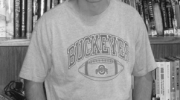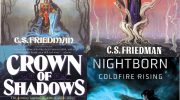 Last time we spoke it was on the release of your previous novel, The Islanders. Does The Adjacent share any common heritage?
Last time we spoke it was on the release of your previous novel, The Islanders. Does The Adjacent share any common heritage?
The Islanders and The Adjacent have more in “common” with each other than with some of the others, because at the beginning I was writing them in tandem: I worked on one during the days, and the other in the evenings. But even then the impulse to do this was because they were very different in tone. I used each one as a break from the other, a change of mood.
However, the doubling up only lasted a few weeks. The Islanders became more of a challenge and I decided to concentrate on that and leave The Adjacent aside for the time being. But this duality is a bit misleading, because I see all my books as being of a piece. It’s a body of work and I’m going steadily through it. I see connections between all the books, and most of the short stories … but that’s simply a personal, internal sense of connection. Each one is separate from the others.
For the benefit of those who haven’t read Adjacent yet can you tell us a bit about it?
It’s set in a near future, where climate change has kicked in pretty much as I expect it will: the tropical and sub-tropical parts of the world have become more or less unlivable, while the temperate zones are experiencing erratic and extreme climate events. (The winter of 2013/14 in the USA and UK might be a small taster for what is to come.) Against this background, terrorism is heightened: at least one group has hold of a weapon that uses the physics of quantum adjacency. The central character, a journalist, has lost his wife to one of these deadly attacks, and the book opens as the authorities are bringing him in for a debriefing.
The Adjacent is your 14th novel, in a career spanning nearly 50 years. What was your motivation for your novel this time around?
I don’t really have motivation for a novel. I’ve been writing all my life and I move on from one book to the next. Fairly slowly, I have to admit, but it goes on happening. I have a story I want to tell, a living I need to make … all that sort of thing.
A lot of the bleed-over between your books has been more subtle, but The Adjacent has clear sections taking place in The Dream Archipelago. Is this something we can expect more of, or was it a particular need of the particular story you were telling?
I never know what’s going to happen until the impulse takes me. All settings in all novels are made up, even the ones which at first seem realistic: the mean streets of Chicago, the boulevards of Paris, and so on. They’re all imaginary landscapes to one degree or another. The Dream Archipelago has been part of my imaginative landscape for about thirty-five years. For readers who haven’t encountered it before I always put in context; but for anyone who has come across it before there should be a feeling of nervous familiarity.
You paint a pretty grim picture of the future although some would probably say that’s where we’re heading if we don’t take the environmentally issues seriously. Is this something you’ve wanted to set the focus on?
You can paint a grim picture of the present day. Or of Victorian England. Or of La Belle Epoque. Or of the Old West. Or you can instead celebrate it, relish it, enjoy it.
Just because a novel is set in an environmentally challenged future doesn’t mean it automatically acquires “seriousness”. As global warming really gets going, people will still make love, eat dinner, laugh at jokes. There’s nothing much that’s inherently “grim” in The Adjacent, although the background is a bit of a problem.
Here we are in the world of the present: with madmen fracturing the bedrock for a few extra years of “cheap” energy, of Russia rattling sabres at its neighbours, of extremists attacking children because they want to go to school, of big corporations polluting the world for the sake of a quick buck. Life goes on, seriously or unseriously. You make of it what you can.
Have you ever struggled between what you would like to happen to a character and what you considered more sensible to occur? Can you tell us when and what did you do at last?
When things are going well, books often feel as if they are writing themselves. Certainly that is true of characters. Once you have got a grip on what they are like, what their past is, what their present concerns or ambitions might be, then many scenes will develop naturally. You just turn them loose and see what happens.
The opposite is also true: if you try to force a character to do or say something that the story demands, quite often the scene will feel later as if it has gone wrong.
Do you think that the cover plays an important part in the buying process?
I’ve never known the answer to this. Have YOU ever bought a book purely on the strength of a cover? I don’t think I have, but I have certainly picked up a lot of books in bookstores because I have found the cover attractive. I think that’s as much as you can hope for a cover … but of course it’s not just the illustration. You want to know what the book is about, get some idea of the kind of writing it contains, have a look at the author if there’s a photo, and so on. A good cover will give you all this, once you have physically picked up the copy.
What are your thoughts on good/bad reviews?
Do you mean “good=favourable” and “bad=unfavourable”? If so … of course I enjoy reading a good review, think the reviewer must be an exceptionally talented, insightful and good-looking person, and probably more besides, but five minutes later I can’t remember either the name of the reviewer or what had been said. If it’s a bad review in that sense, then I carry the wounds for an hour or two, but then the same amnesia sets in.
On the other hand, if by “good” you mean a review that is well thought out, well argued, makes connections or references you hadn’t entirely thought of, and contains judgements that are clearly appropriate, then in that sense there is no such thing as a bad review. For you or against you, a well-written review will always interest the writer of the book, and more often than not will engage the reader’s interest too.
How do you define success as an author?
For many years I was most concerned with financial survival, but on the odd occasions when for a while my assets exceeded my liabilities I felt relieved rather than successful. Apart from cash the traditional symbols of success are huge sales figures, great reviews and awards. Sales are something that the publishers succeed in, because that’s the work they do, that’s what they struggle to achieve, and it’s the result they see or at least measure on a daily basis. Writers almost NEVER see anyone buying a book they’ve written. By the time you receive the royalty statement, the sales have become a mere number, which has a sort of academic interest. Great reviews: see above. I’ve had both good and bad. It’s a kind of break-even situation. The same is true of awards: I’ve won and lost roughly the same number … if you count not getting on a shortlist or a final ballot, I’ve certainly missed vastly more awards than I’ve won. It’s pleasant to be given a prize, but the period when you’re actually writing is such a long time away from the period when an award is made that not only do you never think about these things, by the time it happens, if it does, you are almost always more interested in what you’re working on at the time.
My favourite definition of literary success is Graham Greene’s. He said: “For a writer … success is always temporary, success is only a delayed failure.”
What do you do when you’re not writing, any hobbies?
I watch a lot of movies. I like taking photographs. I read a lot of books. I like walking around in countryside. None of these are hobbies … personally, I enjoy the fairly stress-free life of writing books, and have never seen the point of hobbies. I feel much the same way about holidays: after two or three days away from my desk I want to get back to it.
What’s next, what are you working on now?
I am working on a new novel. There are a couple of short stories I must write. I have various working trips abroad this summer. I plan to visit the USA towards the end of this year to research a new book.
* * * * * * *
Interview by Dag Rambraut, Mark Yon, Eventine – SFFWorld.com © 2014




